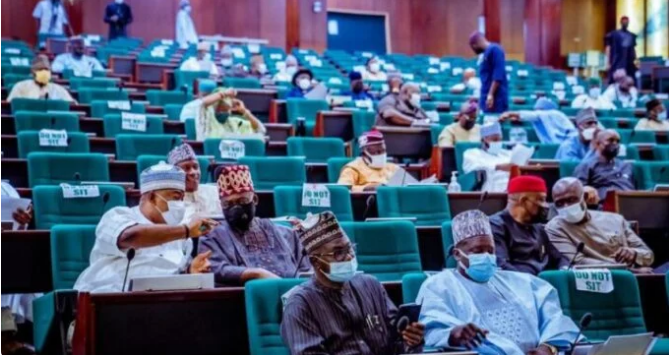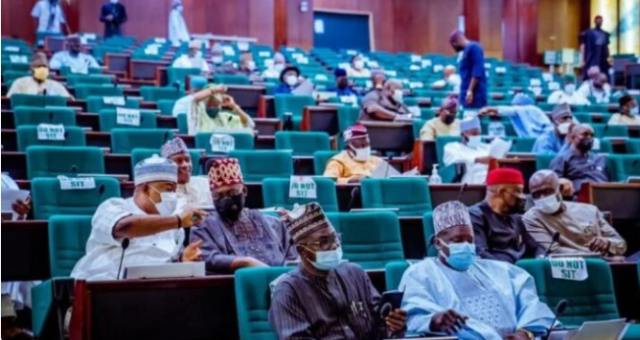
For the first time since the return of democracy in 1999, the ruling party has been unable to produce the majority of members-elect in the house of representatives.
The opposition parties won more seats in the lower legislative chamber than the ruling party at the February 25 national assembly election and the subsequent March 15 supplementary poll.
The number of seats secured by the All Progressives Congress (APC) in the elections is not up to 181 — the required simple majority needed to elect the speaker.
The 10th national assembly will be inaugurated on June 13 and the presiding officers in the house of representatives and senate will be elected on the same date.
The APC has 175 seats, while the opposition parties share 182 seats among them.
The PDP holds 116, Labour Party (LP) has 35 and NNPP controls 19 seats. The All Progressives Grand Alliance (APGA) has five seats, while the African Democratic Congress (ADC), Social Democratic Party (SDP) and the Young Progressives Party (YPP) have two each.
Three federal constituency seats are outstanding as a result of a court order.
The minority parties have already begun to flaunt their numerical strength and have resolved to contest the number four seat in the country. In April, the reps-elect converged on the Transcorp Hilton Hotel, Abuja, to “network, interact and familiarise” before the June inauguration.
At the meeting, Abdulmumin Jibrin, a rep-elect on the NNPP platform, told his colleagues that they must work “very closely” to protect their interests.
Jibrin played an instrumental role in the emergence of the speaker in the 8th and 9th assemblies.
Being a member of the ruling party at the time, he mobilised opposition lawmakers for Yakubu Dogara who was elected speaker of the 8th assembly.
On May 2, the minority parties dubbed the “Greater Majority,” met again in Abuja and later issued a communique stating that a consensus member from among them will be nominated to contest the speakership position.
The caucuses said they have set up an eleven-member committee to scout for credible and acceptable candidates that will vie for the presiding offices for the “unification of Nigerians along the ethnoreligious line”.
According to the lawmakers, their position is “further buoyed by our dominant numerical strength, which by parliamentary ethos, precedent and the constitution of the Federal Republic of Nigeria, 1999, as amended, allows us to contest the presiding officers’ position”.
If the ‘Greater Majority’, as they pride themselves, succeeds in forming an unbroken alliance, they may stun the APC to produce the speaker of the 10th assembly.
The threat is real and this is obviously giving the APC sleepless nights. With its slim majority, the ruling party is not treating the matter with levity. The party is doing everything possible to avoid the experience of the 8th assembly. Yakubu Dogara, who was elected speaker in 2015, was not the APC’s preferred choice.
But as things stand, the opposition parties have little chance of upstaging and snatching the coveted seat from the ruling party.
JOINT TASK 10TH ASSEMBLY
The APC appears to be battle ready and is deploying every weapon in its arsenal to whittle down the strength of the minority parties.
Already, some lawmakers loyal to Femi Gbajabiamila, speaker of the house, have formed a multi-party coalition christened the ‘Joint Task’ with membership cutting across the minority parties.
Bello Kumo, chairman of the coalition, said the Joint Task was formed to support a tumult-free selection process for the 10th house of representatives leadership.
He said the alliance will promote cooperation but protect the independence of the legislature as well as the unity and cooperation of its members.
“We are a multi-partisan forum of the eight political parties that have won seats for the 10th house of representatives,” he said.
Kumo said although they are members of different parties, “the common denominator among members of the forum is the resolve to jointly take up the task of promoting peace, unity and stability of the 10th national assembly and by extension, Nigeria. We can do this in an atmosphere of mutual respect and cooperative partnership between legislature and executive”.
No doubt, the coalition has wormed its way into the minority parties — PDP, LP, SDP, APGA, NNPP and YPP — and the members have pledged to support the nominees of the APC for the position of speaker and deputy speaker. But to what extent the infiltration will succeed remains to be seen.
THE TINUBU-WIKE CONNECTION
The Joint Task also appears to be an alliance between President-elect Bola Tinubu and members of the G5. Kingsley Chinda, an ally of Nyesom Wike, governor of Rivers, co-chairs the coalition.
It is not a hidden fact that Seyi Makinde, governor of Oyo, and Wike are allies of Tinubu despite being members of the PDP.
Last month, Wike said the PDP in Rivers will support any candidate presented by the leadership of APC for the position of speaker of the 10th assembly.
The governor made the remarks when Idris Wase, deputy speaker of the house of representatives, led a delegation of lawmakers to visit him at the government house in Port Harcourt to woo him for his speakership ambition.
“The truth must be told that we are going to support the leadership of your party at the national level,” Wike had said.
Wike and Makinde reaffirmed their support for Tinubu recently when the duo met with the president-elect at the Defence House in Abuja.
“Elections have come and gone, the winner has emerged and, therefore, it is necessary for all Nigerians to rally round to give him (Tinubu) the necessary support for the interest of Nigeria,” Wike said after the meeting.
The governors are, therefore, expected to influence the selection of the over 15 members-elect in their states in the speakership election.
THE LP INTERNAL SQUABBLE
Another factor that is seemingly working against the opposition parties is the internal wrangling in the LP which appears to have divided the members. Already, some of the party’s reps-elect are openly supporting some of the APC speakership hopefuls.
The LP has been in leadership turmoil since Lamidi Apapa, deputy national chairman (north) of the party, declared himself the acting national chairman following the sack of Julius Abure by a federal capital territory (FCT) high court in Abuja.
Some party members in Abure’s ward in Edo state suspended him alongside Samuel Akingbade, national legal adviser; Gbenga Daramola, national financial secretary; Anselem Eragbe, national youth leader; and Abayomi Arabambi, national publicity secretary, over alleged anti-party activities.
The development has factionalised the party with Peter Obi, the LP presidential candidate, insisting that Abure is the “authentic” chairman of the party.
Obi recently said some “agents” are behind the crisis in the party, implying that Apapa might be working for the ruling APC.
Thus, as a divided fold, the coalition of minority parties cannot authoritatively claim to have the 35 reps-elects in the LP in its corner due to the persisting in-fighting in the party.
…AND THE PDP IMBROGLIO
One more factor that may work against the minority parties’ push to control the house of representatives is the gnawing imbroglio in the PDP.
The main opposition party has been unable to get its act together after the general election.
The PDP arguably lost the presidential election because it contested the poll with a divided house. Five of the 14 governors in the party were not in support of the party’s presidential candidate, Atiku Abubakar.
Several members of the PDP are key members of the Joint Task which has declared support for Tajudeen Abbas and Benjamin Kalu — the anointed candidates of the APC for the positions of speaker and deputy.
The minority parties seem to have enough distractions to frustrate their goal of clinching the number four seat in the country.







